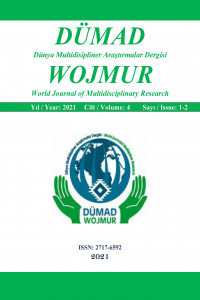COVİD-19'UN BİÇİMLENDİRİCİ DEĞERLENDİRMEYE DAYALI OLARAK BİLGİSAYAR PROGRAMLAMA DERSİNİ ALAN ÖĞRENCİLERİN PERFORMANSLARINA ETKİSİ
Covid-19, Bilgisayar Programlama Modülü, Yüz Yüze Eğitim, Çevrimiçi Eğitim.
COVİD-19 IMPACT ON STUDENTS' PERFORMANCES İN COMPUTER PROGRAMMİNG MODULE BASED ON FORMATİVE ASSESSMENT
___
- Ashby, J., Sadera, W. A., & McNary, S. W. (2011). Comparing student success between developmental math courses offered online, blended, and face-to-face. Journal of Interactive Online Learning, 10(3), 128–140.
- Atchley, W., Wingenbach, G., & Akers, C. (2020). International Review of Research in Open and Distributed Learning Comparison of Course Completion and Student Performance through Online and Traditional Courses Comparison of Course Completion and Student Performance through Online and Traditional Courses.
- Buyrukoglu, S. (2018). Semi-Automated Assessment of Programming Languages for Novice Programmers. July. https://repository.lboro.ac.uk/articles/thesis/Semi-automated_assessment_of_programming_languages_for_novice_programmers/9406070
- Buyrukoglu, S., Batmaz, F., & Lock, R. (2019). Improving marking efficiency for longer programming solutions based on a semi-automated assessment approach. Computer Applications in Engineering Education, 27(3), 733–743. https://doi.org/10.1002/cae.22094
- Čechová, I., Neubauer, J., & Sedlačík, M. (2019). Tracking the university student success: Statistical quality assessment. Journal on Efficiency and Responsibility in Education and Science, 12(1), 12–25. https://doi.org/10.7160/eriesj.2019.120102
- Driscoll, A., Jicha, K., Hunt, A. N., Tichavsky, L., & Thompson, G. (2012). Can Online Courses Deliver In-class Results?: A Comparison of Student Performance and Satisfaction in an Online versus a Face-to-face Introductory Sociology Course. Teaching Sociology, 40(4), 312–331. https://doi.org/10.1177/0092055X12446624
- Hannay, M. (2006). Perceptions of Distance Learning : a Comparison of Online and Traditional Learning. 2(1), 1–11. Johnson, H., & Mejia, M. C. (2014). Online learning and student outcomes in California’s Community Colleges. Public Policy Institute of CA, May, 20. www.ppic.org%0Awww.ppic.org
- Larson, D. K., & Sung, C. H. (2009). Comparing student performance: Online versus blended versus face-to-face. Journal of Asynchronous Learning Network, 13(1), 31–42. https://doi.org/10.24059/olj.v13i1.1675
- Muilenburg, L. Y., & Berge, Z. L. (2005). Students Barriers to Online Learning: A factor analytic study. Distance Education, 26(1), 29–48. https://doi.org/10.1080/01587910500081269
- Pfeiffer, S. I., Petscher, Y., & Kumtepe, A. (2008). The gifted rating scales-school form: A validation study based on age, gender, and race. Roeper Review, 30(2), 140–146. https://doi.org/10.1080/02783190801955418
- Ramaprasad, A. (1983). On the definition of feedback. Behavioral Science, 28(1), 4–13. https://doi.org/10.1002/bs.3830280103
- Sadler, D. R. (1998). Formative assessment: Revisiting the territory. International Journal of Phytoremediation, 21(1), 77–84. https://doi.org/10.1080/0969595980050104
- Shea, P., & Bidjerano, T. (2014). Does online learning impede degree completion? A national study of community college students. Computers and Education, 75, 103–111. https://doi.org/10.1016/j.compedu.2014.02.009
- Sullivan, J. R., Riccio, C. a, & Reynolds, C. R. (2008). Variations in students’ school- and teacher-related attitudes across gender, ethnicity, and age. Journal of Instructional Psychology, 35(3), 296–305.
- Xu, D., & Jaggars, S. S. (2013). The impact of online learning on students’ course outcomes: Evidence from a large community and technical college system. Economics of Education Review, 37, 46–57. https://doi.org/10.1016/j.econedurev.2013.08.001
- ISSN: 2717-6592
- Yayın Aralığı: Yılda 2 Sayı
- Başlangıç: 2019
- Yayıncı: Mer Ak Mersin Akademi Danışmanlık Anonim Şirketi
Guldana SEİTOVA, Asel BUTENOVA, Emin ATASOY
Cemile Ezgi GÜNDÜZ, A. Cenap CEVHERİ
Umut Ali ERGÜZELOĞLU, Bengü KAPLAN
ANADOLU’DA MÜSLÜMAN TOPLUM İNŞA SÜRECİNDE AHİ TEŞKİLATI
ZHONGAR-ALATAU EYALETİ ULUSAL TABİAT PARKI’NDA ETNOGRAFİK TURİZMİN GELİŞİMİ
Zhambyl KANAGATOV, Emin ATASOY, Guldana SEİTOVA, Aruzhan YESHMUKHAMBET
